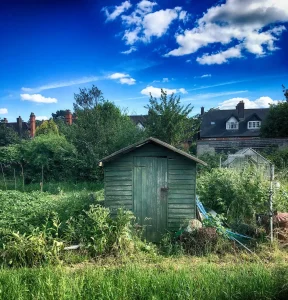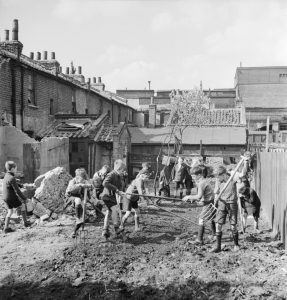Firstly, two poems; which readers may have seen before!
EVERYBODY NEEDS . . .
Everybody needs a garden 
It should be the law!
Large or small, a patch of earth
Could teach us all of nature’s worth
No matter rich or poor
Everyone should know the pleasure
When you harvest what you sow
There’s no better satisfaction
Than this basic ancient action.
And, you comprehend a fraction
Of the need to plant and grow
GARDENING LOVE
I used to hate gardening
When we lived on a hill
When the wind held full sway
And it rained every day
And we battled with ice
To wrench swedes from the clay
But now I love gardening
Whatever the chore
Be it pruning or shearing
Or weeding or clearing
It’s amazingly cheering
And never a bore
The pleasure of gardening
Is hard to define
Like a deep rooted need
To clear ground and weed
For the planting of seed
A skill that has passed
Down the seasons of time
That second photo is of boys in London clearing an area for an allotment. Somebody of my acquaintance has just taken on an allotment; a precious plot indeed. Now we, personally, have never needed to try and acquire one of these patches of land, having always had available space for a garden. I am aware that there are long waiting lists for allotments. So I decided to do a bit of research.
First, some facts; mainly lifted from The Guardian website:
The average waiting time for an allotment is three years
The amount of outstanding applications is 157,820, with waiting times of up to fifteen years. This figure is up 81% from twelve years ago, when the figure was 86,787
The Local Authority with the longest waiting list is Bristol, with 7,630 outstanding applications.
There has been a 65% reduction of allotment land since the mid 20th century
There are an estimated 330,000 allotment plots in the uk.
Right, now for the history. I discovered the website: allotment-garden.org which provided me with a fascinating insight into the ups and downs of the allotment story.
Anglo Saxons (410 – 1066) cleared tracts of land of woodland to grow food, and this land, ‘which would be held in common’ was the first known communal system. The ‘strip’ or ‘open field’ system which was prevalent through the middle ages (500 -1500 ad) necessitated communal action. Was this a rare time in history when land use was shared out in an equable manner?
The first overt land grab happened in 1066, when William the Conqueror doled out large tracts of land (on loan) to the Manorial Lords, Monastries and the Church.
Following the Reformation (1540) most of Church lands were confiscated, but transferred, via the Crown, to the Lords.
In the late 1500s (Elizabeth 1st) common land began to be enclosed; dispossesing the poor. In compensation ‘allotments’ were attached to tenant cottages; but the land was still the property of the Landowner. I think it was around this time that the most common size of allotments was 10 rods; the equivalent of 302 square yards, or 253 square metres.
17th -18th Century: More and more enclosures were applied, as the move from a subsistence economy to the Industrial system increased the numbers of the poor who, without any social security system, could starve, literally, for lack of food; or land on which to grow their own.
The Enclosure Act of 1773 enabled more enclosures of land; and removed the right of access to commoners.
In 1786 there were 250,000 independent landowners. In 1816 this number had reduced to 32,000; the direct result of enclosure increases.
There were further Enclosure Acts in 1836, 1840 and 1845. In 1845 it was deemed necessary to make amendments to ‘provide better protection of the interests of small proprietors and the public’; mainly enacted due to the fear of civil unrest and revolt. The Act required Commissioners ‘To make provision for the landless poor’ with ‘Field Gardens’ of a quarter of an acre; really beginning the system of allotments of today. However, of the specified 615,000 acres enclosed, only 2,200 acres actually became allotments.
The Allotment Acts of 1908 and 1922 made further modifications; and there have been further amendments to Allotment Acts up until 1950.
Ironically, the two World Wars highlighted the necessity of allotment food growing. Both times our Island was blockaded, causing food shortages, with an increase in the demand for allotments and small parcels of land to be allocated for same. The food shortages during the second World War were worse than the first, and public areas (parks, sports fields etc.) were utilised; while the populace were encouraged to ‘Dig For Victory’ and grow their own food; saving shipping for war materials.
After the wars the increased demand for building land for housing reduced allotment numbers. No change there then.
And, one last fact: During the second world war allotments were estimated to contribute 1.3 million tonnes of vegetables from 1.4 million plots!
Well, that’s the factual history dealt with, Now for my opinion!
With the increasing reality of future food shortages, exacerbated by climate change and addtional factors such as Brexit, I hope that consistent allotment provision will hold its own against the ever growing public demand for housing; notwithstanding the necessity for both. And it’s not just the health benefits, or increased supply of healthy local food that I think of as important. Our ubiquitous media is forever telling us that our mental health is becoming ever more fragile; especially among the younger generations.
It doesn’t take a genius to work out that, if the young spend most of their time glued to their phones or other comparable gadgets, they are not enjoying the benefits of open air activity; with a different and wider outlook on the world, and their personal horizons. I read recently that youngsters all over the globe have increasing levels of shortsightedness; exacerbated by too much close screen work. Well, who would credit it!
Common sense cynicism aside, I’d like to see provision for allotments allowed in as many availabe spaces as possible, especially where chidren are involved. All schools could be allocated plots for the express purpose of educating our kids in the joy of growing and the immense feeling of achievement when they get to eat the end product; perhaps in the school canteen! A final quote from allotment-garden.org as to what the future holds:
“Concerns about genetic modification of foodstuffs, chemical pollution, contamination of our food and the desire for the ultimate in freshness has seen empty plots filled and waiting lists appear for sites that previously had high vacancy rates. This increase in demand should be combined with a willingness to require/insist that provision of allotments “As allowed under Statute” will see numbers rise from present levels”
Gardening is a healing rejunivating occupation. It can keep us fit in body and mind. Allotment communities work together (mostly!) and I find it quite easy to hark back to those Anglo Saxons, clearing their fields to grow food on land “which would be held in common” and equate them to the allotment holders of today; tending their ‘strips’; and feeding their families and friends with wholesome, organic, local fruit and veg!

Excellent poems and summary of this essential
part of life – mine anyway! Our waiting list is 56 people/ average wait 3 years. I hang on to my little plot like grim death!!!
A-ha, I can hazard a guess as to where the inspiration for this post came from!
I was strangely excited to learn of Mrs C’s acquisition of their allotment. It’s in a fab position with some lovely views over the valley, and we spent a merry couple of days clearing, digging and de-weeding. It also has a bonus of an excellent local pub within a minute’s walk, so it’s been nice to debrief with a cold drink, and reflect on the day’s achievements!
We’ve been keen to start growing some fruit and vegetables since moving, but our new garden isn’t ideal – so we’re really happy to have access to the allotment. I’m particularly looking forward to the first harvest (although we have already taken home a huge bag of potatoes, blackberries, raspberries and apples left by the previous tenant).
It’s really interesting to learn of the history of allotments. It’s also interesting that Bristol is the city with the longest waiting list, although not surprising – we do have a Green MP after all!
Thanks Jackie. I don’t know how I would have got through all the lockdowns without my wonderful allotment. Fresh air, fellow gardeners and the chance to be ‘normal’!
Unfortunately, Bristol City’s Green (?) Council have recently doubled rents and introduced so many rules and regulations that soon allotments will be the preserve of middle class people without kids.
Fortunately, the Bristol East Allotment shop is still going strong! So any Bristol allotmenteers, please use it!!